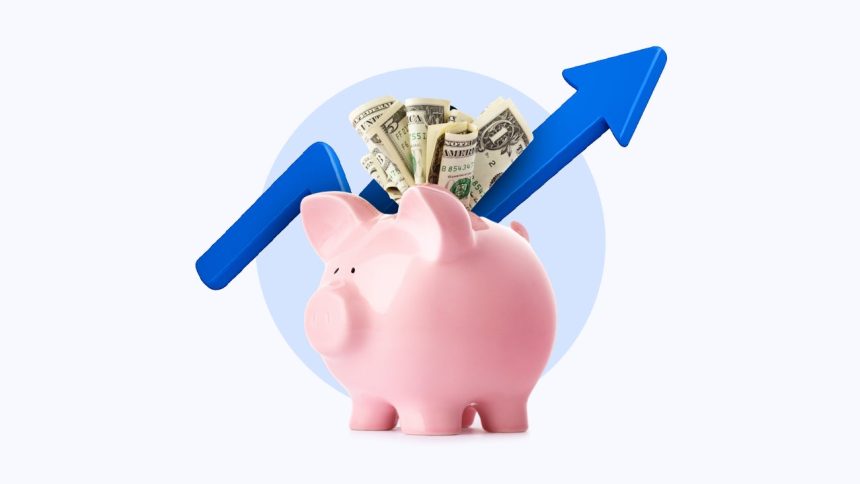Image and illustration by Bankrate
If you have some money stashed in a high-yield savings or money market account, you’re likely among the biggest winners in personal finance these days. Many of the best deposit accounts are paying historically high annual percentage yields (APYs), which is an indirect result of the federal funds rate being at its highest target range since 2007, outside the current rate cycle.
If you’re wondering which type of savings account will yield you the most interest on your money, we’ll show you as we compare how much you can earn with $10,000 in a money market account vs. a savings account.
Comparing the best high-yield savings rate vs. the best money market account rate
Bankrate’s editorial team regularly monitors rates offered by dozens of banks and credit unions. Among these financial institutions, the best high-yield savings account rate is currently 4.35 percent APY, while the best money market account rate is 4.40 percent APY. With APYs this similar, you’ll end up with nearly identical amounts in interest earnings: there would only be a difference of $5 in total earnings after a one-year period.
| Type of account | Best APY |
Interest earned in 6 months on $10,000 |
Interest earned in 1 year on $10,000 |
Total principal plus interest in 1 year |
| High-yield savings account | 4.35% | $215 | $435 | $10,435 |
| Money market account | 4.40% | $218 | $440 | $10,440 |
Now, these calculations assume that the APY stays the same for a whole year. That’s not a guarantee because both savings and money market account rates are variable, meaning the banks can change them at any time, often based on factors such as changes to the Federal Reserve’s benchmark rate or how badly the bank is in need of new deposits.
Account features to compare in addition to APY
Right now, the best APYs are highly similar for the top-earning high-yield savings and money market accounts. However, there are other factors to consider when deciding which type of account is best for you.
- Check-writing and debit card capabilities: Unlike the typical savings account, money market accounts sometimes come with a debit card and checks (though there are often limits on the number of debit transactions and checks you can write per month).
- Monthly fees: When shopping around, look for an account that doesn’t charge monthly fees so you can maximize the interest you’re earning.
- Minimum required to earn the high APY: While some high-yielding accounts require no minimum to earn the high rate, others may require $5,000 or even more. Be sure to choose an account that doesn’t require more than you’re comfortable depositing.
High-yield savings accounts and money market deposit accounts are more alike than different. If your objective is to just earn the highest yield, then choosing between them is six of one, half-dozen of the other. If you need check-writing capability, that tips the scales toward a money market account.
— Greg McBride, CFA, Bankrate chief financial analyst
When to consider a certificate of deposit (CD) instead
CDs are another option for savers seeking to earn high rates. The best CD rates, especially those for shorter terms, are currently similar to the top APYs of money market and high-yield savings accounts. And one advantage of a CD that sets it apart is they typically guarantee your APY for the length of the CD term (though accessing your funds sooner results in an early withdrawal penalty).
“If you have a cash need at a specific point in the future or are looking to lock in predictable interest income, then a CD might be the better choice — as long as you can live without the money in the interim,” McBride says. “If you get that part wrong, any early withdrawal penalty could devour the additional interest you were aiming for when you locked in the CD.”
Bottom line
These days, high-yield savings accounts and money market accounts are nearly neck and neck when it comes to the best rates. When choosing the right account, there are many options to consider for highly competitive APYs. Also take into account factors such as check-writing privileges and a debit card — which you’ll find with some money market accounts but not with savings accounts. A CD is also an option if you prefer a guaranteed rate and are comfortable locking away your money for the entire term.
Why we ask for feedback
Your feedback helps us improve our content and services. It takes less than a minute to
complete.
Your responses are anonymous and will only be used for improving our website.
Help us improve our content
Read the full article here















